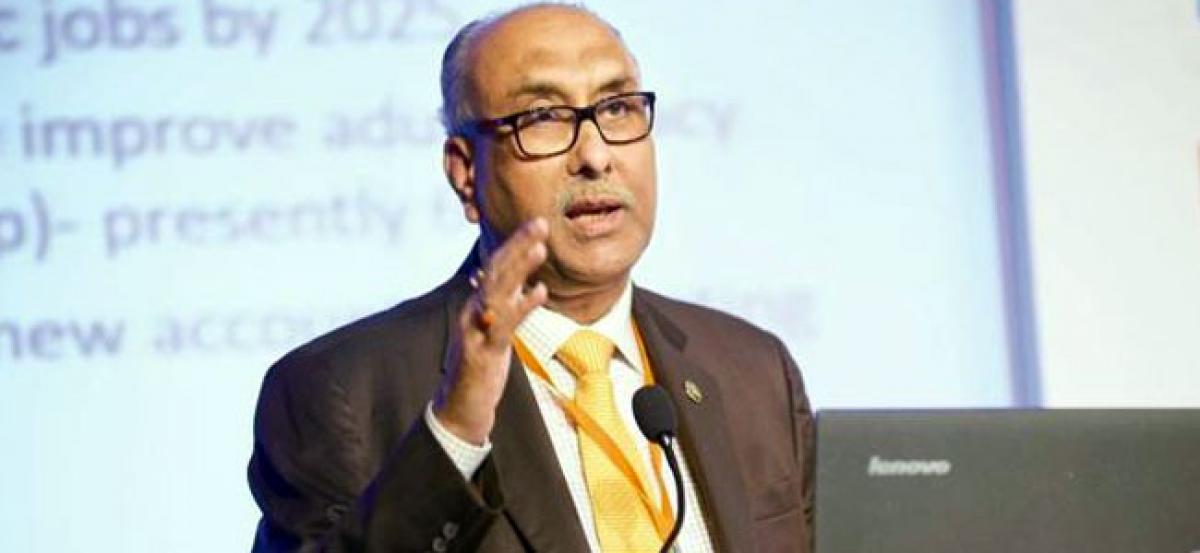Live
- Severe Smog Engulfs Delhi: Flights Delayed and Air Quality Hits Dangerous Levels
- Court orders confiscation of govt assets in compensation dispute
- Govt out to unmask instigators as mantris hint at strict action
- Aamir Khan and Kiran Rao Launch Oscars Campaign for ‘Laapataa Ladies’ with a Fresh Title
- ED questions CM’s PA , MP G Kumar Naik in MUDA scam
- Revanth honours Nehru, emphasises education reforms
- NASA’s Shocking Health Crisis: Astronauts Losing Drastic Weight in Space
- Govt locked up Vidhana Soudha, brought money bags, held polls: Bommai
- Children’s Day 2024: Heartfelt Wishes, Quotes, and Status Messages to Celebrate with Loved Ones
- Minister Damodar Raja Narsimha to Visit Sangareddy Today
Just In

Urging all to not fall prey to falsehoods on future of weak banks, RBI Deputy Governor S S Mundra today said lenders\' inclusion under prompt corrective action (PCA) is for timely improvement of their performance. \"PCA is
Mumbai: Urging all to not fall prey to falsehoods on future of weak banks, RBI Deputy Governor S S Mundra today said lenders' inclusion under prompt corrective action (PCA) is for timely improvement of their performance. "PCA is one among such tools which involves monitoring of performance indicators of banks as an early warning exercise and is initiated once such thresholds as relating to capital, asset quality are breached," he said here.
"Its objective is to facilitate the banks to take corrective measures including those prescribed by the RBI in a timely manner in order to restore the thresholds or financial strength," Mundra said while speaking at a Governance Now event. The deputy governor expressed strong displeasure on social media messages spreading false information about the future of some of the nine banks under the PCA framework and urged everybody to "apply the mind" while reading those.
Stating that the PCA is akin to taking an injured athlete to bed rest, he said, "By no means does the framework suggest that bank would cease to carry out normal banking operations, including lending, as is being mischievously suggested." Mundra said the PCA framework has been in existence since December 2002 and the guidelines were last reviewed in April this year to make it contemporary. It can be noted that once taken into PCA, there are restrictions on a bank like announcing dividend, opening branches, hiring and giving loans to companies rated below investment grade.
The list of lenders under the PCA include IDBI Bank, Central Bank of India, Indian Overseas Bank, Bank of Maharashtra, UCO Bank and Dena Bank, which are facing issues either with high NPAs or low capital levels. The commercial banker-turned-central banker also made his concern on media commentary on NPAs public, saying the notion of banks being on the verge of collapse due to the asset quality stress is misleading. "The current stock of NPAs in the system is Rs 7 trillion and if we add the restructured accounts, it will touch over Rs 13 trillion," he said.
He also came out strongly against notions of RBI being responsible for the high exposures to corporate groups, which are the biggest pain points right now, making it clear that the regulator has no role to play in commercial decisions taken by the lenders. Explaining that farm loan waivers do not directly result in loan losses for the banks as the respective state governments pay the bank, Mundra said the sops will not have any impact on the banks' health.
Mundra acknowledged that the RBI has raised concerns over the farm loan waivers, but made it clear that those are "driven by entirely different considerations." In the past, the RBI brass expressed displeasure over populist moves for fears of it affecting the credit culture, being a disincentive for honest borrower and putting the onus on the taxpayer. Meanwhile, Mundra also warned customers against misusing a recently introduced rule wherein the liability of a customer is capped at Rs 25,000.

© 2024 Hyderabad Media House Limited/The Hans India. All rights reserved. Powered by hocalwire.com







